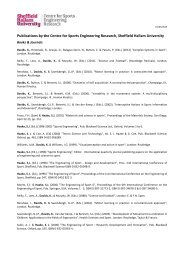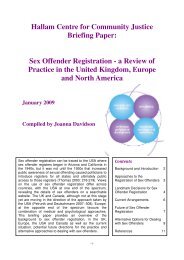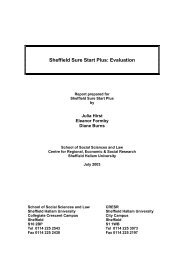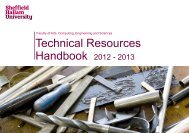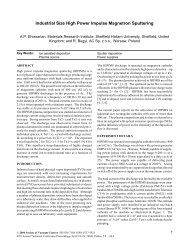The exercise of judicial discretion in rent arrears cases - Sheffield ...
The exercise of judicial discretion in rent arrears cases - Sheffield ...
The exercise of judicial discretion in rent arrears cases - Sheffield ...
You also want an ePaper? Increase the reach of your titles
YUMPU automatically turns print PDFs into web optimized ePapers that Google loves.
As another put it:<br />
“My start<strong>in</strong>g po<strong>in</strong>t is, if I see the <strong>arrears</strong> are less than two hundred pounds, then I will<br />
probably say, ‘Well why is it reasonable that I should make an order at all? Why not<br />
adjourn it on terms?’” (DJ U)<br />
<strong>The</strong> impact <strong>of</strong> the level <strong>of</strong> <strong>arrears</strong> on orders is considered further <strong>in</strong> Chapter 7.<br />
Another reason for adjourn<strong>in</strong>g was where the tenant had made an agreement with the<br />
landlord and was keep<strong>in</strong>g to it:<br />
“You’ve reached an agreement, the tenant is pay<strong>in</strong>g – why should I penalise them by<br />
putt<strong>in</strong>g on a suspended order?” (DJ O)<br />
This was clearly l<strong>in</strong>ked to an awareness <strong>of</strong> the greater legal risks associated with a<br />
suspended possession order than an adjournment (see the discussion <strong>of</strong> tolerated<br />
trespassers, above p. 8). As one judge pondered:<br />
“<strong>The</strong>re are so many disadvantages to a suspended order legally, that we ought to<br />
make more <strong>of</strong> these [adjournments on terms], but do they actually do the trick? Is it<br />
an effective method <strong>of</strong> pay<strong>in</strong>g the <strong>rent</strong>, <strong>in</strong> other words? I don’t know the answer to<br />
that question at all.” (DJ G)<br />
This change <strong>in</strong> practice has also been reflected <strong>in</strong> the requests made by landlords and to<br />
some extent this must be seen as a re<strong>in</strong>forc<strong>in</strong>g process. As judges appear more <strong>in</strong>cl<strong>in</strong>ed to<br />
grant adjournments landlords are more likely to ask for them. This is explored further <strong>in</strong><br />
Chapter 5.<br />
<strong>The</strong> impact <strong>of</strong> attendance on outcomes<br />
Representation was shown to assist tenants <strong>in</strong> obta<strong>in</strong><strong>in</strong>g more favourable outcomes <strong>in</strong> 1996.<br />
This pattern was also replicated <strong>in</strong> 2004, with those be<strong>in</strong>g represented by a solicitor or duty<br />
desk the least likely to subject to an outright possession order and the most likely to obta<strong>in</strong><br />
an adjournment. This could not be expla<strong>in</strong>ed by those be<strong>in</strong>g represented hav<strong>in</strong>g lower level<br />
<strong>of</strong> <strong>arrears</strong>; <strong>in</strong>deed they had the highest average number <strong>of</strong> weeks <strong>in</strong> <strong>arrears</strong> at the date <strong>of</strong><br />
the hear<strong>in</strong>g.<br />
19



